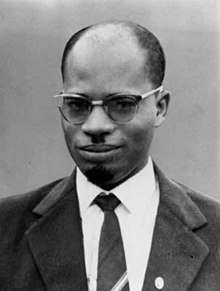Albert Kalonji
Albert Kalonji Ditunga (6 June 1929 – 20 April 2015)[1][2] was a Congolese politician best known as the leader of the short-lived secessionist state of South Kasai (Sud-Kasaï) during the Congo Crisis.
Albert Kalonji | |
|---|---|
 | |
| Head of State of South Kasai (first as President, later as Mulopwe/God-king/Emperor) | |
| In office 9 August 1960 – 5 October 1962 | |
| Preceded by | Edmond Mukanya Mulenda |
| Succeeded by | position disestablished |
| Personal details | |
| Born | 6 June 1929 Hemptinne (near Luluabourg), Belgian Congo (Now Katende, Democratic Republic of the Congo) |
| Died | 20 April 2015 (aged 85) Mbuji-Mayi, Democratic Republic of the Congo |
| Political party | Mouvement National Congolais-Kalonji (MNC-K) |
Early career
Kalonji, a chief from the Luba ethnic group, began his political career under Belgian colonial rule as a member of the nationalist Mouvement National Congolais (MNC) party led by Patrice Lumumba. Kalonji, however, split with Lumumba to form a federalist faction of the party, known as the Mouvement National Congolais-Kalonji (MNC-K), which failed to achieve significant success while Lumumba was made Prime Minister of the independent Congo in 1960.
South Kasai
Within days of being independent from Belgium, the new Republic of the Congo[lower-alpha 1] found itself torn between competing political factions, as well as by foreign interference. As the situation deteriorated, Moise Tshombe declared the independence of Katanga Province as the State of Katanga on 11 July 1960.
Kalonji, claiming that the Baluba[lower-alpha 2] were being persecuted in the Congo and needed their own state in their traditional Kasai homeland, followed suit shortly afterwards and declared the autonomy of the diamond-rich[3] South Kasai on 8 August, with himself as head.[4] Unlike Tshombe, Kalonji shrank from declaring full independence from the Congo and rather declared its "autonomy" with a hypothetical, federalised Congo. He, as representatives of his party, continued to sit in the Congolese parliaments in Léopoldville. In emulation of Winston Churchill, he adopted the V sign for victory to express his confidence in South Kasai's ability to achieve its goals.[5]
On 12 April 1961, Kalonji's father was granted the title Mulopwe (which roughly translates to "emperor" or "god-king"),[6] but he immediately "abdicated" in favor of his son.[4] On 16 July, In April 1961, Kalonji took the royal title Mulopwe ("King of the Baluba") to tie the state more closely to the pre-colonial Luba Empire. The act divided the South Kasaian authorities and Kalonji was disavowed by the majority of South Kasai's parliamentary representatives in Léopoldville.[d] The move was controversial with members of Kalonji's own party and cost him much support.
Kalonji's reign, however, proved to be short-lived. As preparation for the invasion of Katanga, Congolese government troops invaded and occupied South Kasai, becoming involved in ethnic-based violence and displacing thousands of Baluba. On 30 December, Kalonji was arrested.[4] He did manage to escape shortly afterwards. The administrative apparatus of South Kasai survived, under Congolese occupation, until a coup d'état was led against Kalonjists by the state's Prime Minister, Joseph Ngalula, in October 1962 when the state returned to the Congo.[4]
Legacy and subsequent activities
Escaping from arrest, Kalonji fled to Francoist Spain. He returned to the Congo between 1964-65 to hold a ministerial portfolio in the central government led by Tshombe but returned to exile following Joseph-Désiré Mobutu's 1965 coup d'état. Under Mobutu, the territory of South Kasai was divided into two regions to discourage future secessionist tendencies.[4] In exile in Europe, Kalonji still claimed the title Souverain Possesseur des Terres occupées par les Balubas (Sovereign Owner of the Lands occupied by the Baluba).[4] He wrote about his experiences in Memorandum: Ma lutte, au Kasai, pour la Verité au service de la Justice ("Memorandum: My fight in Kasai in the Service of Truth and Justice", published 1964) and Congo 1960. La Sécession du Sud-Kasaï. La vérité du Mulopwe ("Congo 1960. The South Kasai Secession. Truth from the Mulopwe", published 2005). He died in April 2015 and was buried in Katende.
References
- Not to be confused with the neighboring country of the same name, sometimes known as Congo-Brazzaville.
- In most Bantu languages, the prefix ba- (or sometimes wa-) is added to a human noun to form a plural. As such, Baluba refers collectively to members of the Luba ethnic group.
Citations
- Sando, Kabuya Lumuna (1993). Nord-Katanga 1960-1964: De la sécession à la guerre civile - Le meurtre des chefs. 196: L'Harmattan. ISBN 2738412637.CS1 maint: location (link)
- Décès de M. Albert Kalonji Ditunga Mulopwe Archived 2016-03-04 at the Wayback Machine Agence Congolaise de Presse. 30.5.2015 (in French)
- Larry Devlin, Chief of Station, Congo: Fighting the Cold War in a Hot Zone, p. 62
- The Imperial Collection: The Autonomous State of South Kasai
- "Sous le Signe V Kalonji veut reconquérir le Kasaï". Le Soir Illustré (in French). 15 September 1960.
- "''Zaire: A Country Study'', "Establishment of a Personalistic Regime"". Lcweb2.loc.gov. Retrieved 2014-08-03.
_-_Commemoration_Independence_Stamp.jpg)